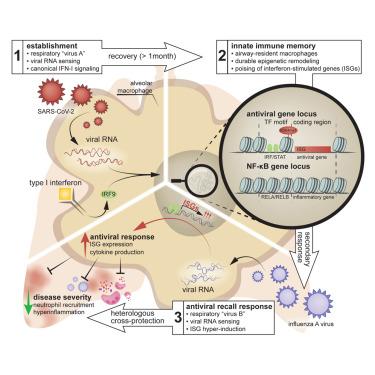Antiviral innate immune memory in alveolar macrophages following SARS-CoV-2 infection ameliorates secondary influenza A virus disease
IF 25.5
1区 医学
Q1 IMMUNOLOGY
引用次数: 0
Abstract
Pathogen encounter can result in epigenetic remodeling that shapes disease caused by heterologous pathogens. Here, we examined innate immune memory in the context of commonly circulating respiratory viruses. Single-cell analyses of airway-resident immune cells in a disease-relevant murine model of SARS-CoV-2 recovery revealed epigenetic reprogramming in alveolar macrophages following infection. Post-COVID-19 human monocytes exhibited similar epigenetic signatures. In airway-resident macrophages, past SARS-CoV-2 infection increased activity of type I interferon (IFN-I)-related transcription factors and epigenetic poising of antiviral genes. Viral pattern recognition and canonical IFN-I signaling were required for the establishment of this innate immune memory and augmented secondary antiviral responses. Antiviral innate immune memory mounted by airway-resident macrophages post-SARS-CoV-2 was necessary and sufficient to ameliorate secondary disease caused by influenza A virus and curtailed hyperinflammatory dysregulation and mortality. Our findings provide insights into antiviral innate immune memory in the airway that may facilitate the development of broadly effective therapeutic strategies.

SARS-CoV-2 感染后肺泡巨噬细胞中的抗病毒先天免疫记忆可改善继发性甲型流感病毒疾病
病原体相遇会导致表观遗传重塑,从而形成由异源病原体引起的疾病。在此,我们研究了常见呼吸道循环病毒背景下的先天免疫记忆。在一个与疾病相关的 SARS-CoV-2 恢复小鼠模型中,对气道驻留免疫细胞的单细胞分析显示,肺泡巨噬细胞在感染后发生了表观遗传重编程。COVID-19 后的人类单核细胞也表现出类似的表观遗传特征。在气道驻留的巨噬细胞中,过去的 SARS-CoV-2 感染增加了 I 型干扰素(IFN-I)相关转录因子的活性和抗病毒基因的表观遗传学定位。这种先天性免疫记忆的建立需要病毒模式识别和典型的 IFN-I 信号传导,并增强了继发性抗病毒反应。SARS-CoV-2后气道驻留巨噬细胞建立的抗病毒先天性免疫记忆对于改善甲型流感病毒引起的继发性疾病、减少高炎症失调和死亡率是必要且充分的。我们的研究结果为了解气道中的抗病毒先天免疫记忆提供了见解,这可能有助于开发广泛有效的治疗策略。
本文章由计算机程序翻译,如有差异,请以英文原文为准。
求助全文
约1分钟内获得全文
求助全文
来源期刊

Immunity
医学-免疫学
CiteScore
49.40
自引率
2.20%
发文量
205
审稿时长
6 months
期刊介绍:
Immunity is a publication that focuses on publishing significant advancements in research related to immunology. We encourage the submission of studies that offer groundbreaking immunological discoveries, whether at the molecular, cellular, or whole organism level. Topics of interest encompass a wide range, such as cancer, infectious diseases, neuroimmunology, autoimmune diseases, allergies, mucosal immunity, metabolic diseases, and homeostasis.
 求助内容:
求助内容: 应助结果提醒方式:
应助结果提醒方式:


